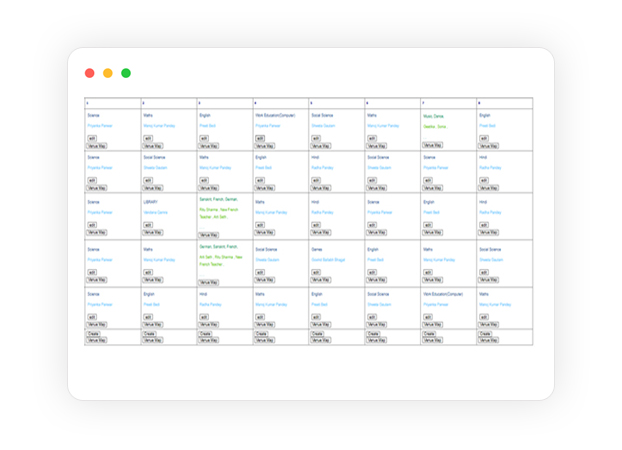Timetable Management is a crucial component of School ERP that helps schools efficiently schedule classes, subjects, and activities while providing easy access for teachers and students.
Here are key features and benefits of such a module:
Features
1. Automated Timetable Generation
- Create class schedules automatically based on predefined parameters such as subjects, teachers, and classrooms.
2. Customizable Timetable Templates
- Design and customize timetable templates to accommodate different grade levels, class sections, and special requirements.
3. Teacher Allocation
- Assign teachers to specific subjects, classes, and time slots, ensuring optimal resource allocation.
4. Classroom Allocation
- Assign classrooms and resources to classes and activities as needed.
5. Subject Allocation
- Ensure that subjects are distributed evenly across the timetable and meet curriculum requirements.
6. Real-Time Timetable Access
- Teachers and students can access their timetables 24/7 through a web portal or mobile app.
7. Schedule Modifications
- Allow teachers to request changes to the timetable based on specific subject needs or class preferences.
8. Conflict Resolution
- Automatically identify and resolve scheduling conflicts, such as teacher unavailability or resource double-booking.
9. Class Rotation
- Implement class rotation schedules to evenly distribute class times among different subjects.
10. Attendance Integration
- Integrate the timetable with attendance tracking to monitor student and teacher presence in class.
Benefits
- Efficient Resource Utilization: Optimize the allocation of teachers, classrooms, and other resources to reduce conflicts and maximize efficiency.
- Accessibility: Teachers and students can access their timetables at any time, which is especially useful for staying organized and planning ahead.
- Flexibility: Allow teachers to request modifications to the timetable to accommodate special events, projects, or curriculum changes.
- Conflict Resolution: Automatically detect and resolve scheduling conflicts to minimize disruptions.
- Transparency: Keep all stakeholders informed about class schedules, reducing confusion and improving attendance.
- Improved Learning: Ensure that classes are evenly distributed throughout the day to prevent student fatigue and enhance learning outcomes.
- Time Management: Help teachers and students manage their time effectively by providing clear schedules and reminders.
- Data Integration: Integrate timetable data with other modules, such as attendance and examination management, for a comprehensive view of school operations.
- Empowerment: Give teachers a degree of control over their schedules, which can lead to greater job satisfaction and productivity.
A Timetable Management module in School ERP streamlines the scheduling process, enhances organization, and promotes efficient resource utilization, ultimately benefiting both teachers and students in their daily school activities.



